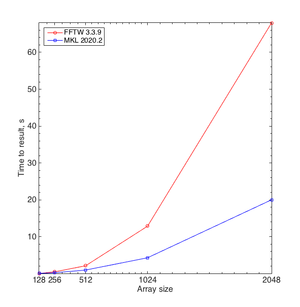Development/FFTW: Difference between revisions
S Richling (talk | contribs) No edit summary |
K Siegmund (talk | contribs) |
||
| (3 intermediate revisions by 2 users not shown) | |||
| Line 26: | Line 26: | ||
The '''Intel Math Kernel Library (Intel MKL)''' offers FFTW2 (for version 2.x) and FFTW3 (for version 3.x) interfaces to the Intel MKL Fast Fourier Transform and Trigonometric Transform functionality. These interfaces enable applications using FFTW to gain performance with Intel MKL without changing the application source code. Therefore, it is highly recommended to use Intel MKL instead of a separate FFTW installation. |
The '''Intel Math Kernel Library (Intel MKL)''' offers FFTW2 (for version 2.x) and FFTW3 (for version 3.x) interfaces to the Intel MKL Fast Fourier Transform and Trigonometric Transform functionality. These interfaces enable applications using FFTW to gain performance with Intel MKL without changing the application source code. Therefore, it is highly recommended to use Intel MKL instead of a separate FFTW installation. |
||
→ see the article on mkl: [[Development/MKL]] |
|||
= FAQ = |
= FAQ = |
||
| Line 44: | Line 46: | ||
* [https://de.wikipedia.org/wiki/Math_Kernel_Library Wikipedia article (german)] |
* [https://de.wikipedia.org/wiki/Math_Kernel_Library Wikipedia article (german)] |
||
* [https://en.wikipedia.org/wiki/Math_Kernel_Library Wikipedia article (english)] |
* [https://en.wikipedia.org/wiki/Math_Kernel_Library Wikipedia article (english)] |
||
---- |
|||
[[Category:Numerical_libraries]][[Category:BwUniCluster]][[Category:BwUniCluster_2.0]][[Category:BwForCluster_Chemistry]][[Category:BwForCluster_JUSTUS_2]][[Category:BwForCluster_BinAC]] |
|||
Latest revision as of 10:12, 9 May 2025
|
The main documentation is available on the cluster via |
| Description | Content |
|---|---|
| module load | numlib/mkl |
| License | Commercial. See EULA. |
| Citing | n/a |
| Links | Intel MKL Homepage | FFTW Homepage |
| Graphical Interface | No |
Description
The Fastest Fourier Transform in the West (FFTW) is a software library for computing discrete Fourier transforms in one or more dimensions, of arbitrary input size, and of both real and complex data (as well as of even/odd data, i.e. the discrete cosine/sine transforms or DCT/DST). FFTW was developed by Matteo Frigo and Steven G. Johnson at the Massachusetts Institute of Technology.
The Intel Math Kernel Library (Intel MKL) offers FFTW2 (for version 2.x) and FFTW3 (for version 3.x) interfaces to the Intel MKL Fast Fourier Transform and Trigonometric Transform functionality. These interfaces enable applications using FFTW to gain performance with Intel MKL without changing the application source code. Therefore, it is highly recommended to use Intel MKL instead of a separate FFTW installation.
→ see the article on mkl: Development/MKL
FAQ
Q: Why is there no FFTW module on the cluster?
A: MKL exhibits better performance than FFTS libraries (see Figure on the right). Therefore, we recommend to use MKL and do not offer a separate FFTW installation.
Q: Why does my code complain about argument of type "long double *" is incompatible with parameter of type "double *" ?
A: The interfaces do not support long double precision because Intel MKL FFT functions operate only on single- and double-precision floating point data types. For the very rare case that you need extended data types, please submit a support ticket at https://www.bwhpc.de/supportportal.
